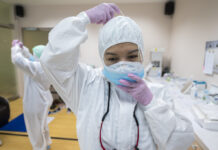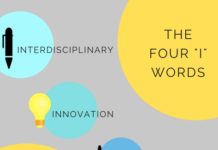Sleep more. This is the key advice to success that Mike Kirkup, director of VeloCity, had to give at this year’s TEDxUW event. Kirkup was just one of many speakers addressing a packed room at the Tannery in downtown Kitchener March 15.
“UW is where ideas start. TED is where ideas spread,” said Assad Habib, TEDxUW’s chair on the marriage of the two taglines.
The first speaker of the day was Rod Regier, the executive director of economic development for the City of Kitchener. Regier spoke about the transformation of the Kitchener economy from one of manufacturing to one of creativity.
“How is it that we came to be a city fully engaged in the creative economy when only six years ago this was an empty hall,” Regier said, referring to the Tannery, which has had a quick transformation from vacant factory to tech-hub.
Regier said the reason Kitchener has thrived in a creative economy rather than degrading after the end of the manufacturing phase is that the city “turned economic development into a corporate priority.”
He listed the many projects the city has invested in what he calls the “Innovation District” located in downtown Kitchener. Developments like the UW School of Pharmacy, the Kaufman Lofts, and the Tannery transformed what was once a manufacturing wasteland to what is now referred to as “the Silicon Valley of the north.”
Regier said the partnerships the City of Kitchener built with various organizations such as UW and Communitech are what helped boost the city’s creative economy.
“Every parking lot represents lost economic and creative potential,” Regier said.
The event was split up into four sessions of back-to-back talks with entertainment and networking breaks in between.
“In a world of abundance, the only true scarce resource is time,” Kirkup said during his talk. Kirkup’s three tips for better productivity are: exercising regularly, planning your day, and improving yourself each day — do something that will allow you to become a better human being, he clarified.
Other speakers for the event included Josh Neufeld, associate professor of biology at UW; Ginny Dybenko, executive director of UW’s Stratford campus; Christina Marchand, AHS student; Frank Gu, chemical engineering professor; Dave Wilkin, founder of 10,000 Coffees; and Paul Salvini, chief technology officer for Christie Digital.
Marchand spoke about “minding the gap,” a concept she became familiar with after returning to Canada from four months at a birthing clinic in Uganda. She shared the constant struggle experienced between providing good care and rationing supplies.
She ended her talk by explaining her most used word in Uganda: sindica, meaning to push.
“Sindica yourself to ask why you take in knowledge,” she said. “Sindica to find how to mind the gap that you see in your world.”
Dave Wilkin’s talk was tailored for the young audience he spoke to. As a young person himself, Wilkin spoke to the millennial generation saying they are, “the most valuable yet unknown resource.”
Wilkin founded the organization 10,000 Coffees after his own job-hunting experiences taught him a thing or two about how to put yourself out there. “I am an entrepreneur by mistake,” he said.
Wilkin said during his job hunts, he knew a resumé wouldn’t get him anywhere, so he made a portfolio and began having conversations with professionals over coffee. He then went on to create an organization that would help other young people connect with professionals over coffee.
Wilkin’s three pieces of advice are to say goodbye to resumés, flip mentorship upside-down, and get rid of egos.
“We need to have untraditional conversations with no strings attached,” Wilkin said of the need for mentorship. He added that mentor relationships need to be mutually exclusive.
Wilkin ended his talk with a challenge to millenials: “Change the headlines that make the news everyday about our generation.”
The TEDxUW team organized the event in just nine weeks with a core team of eight people and countless volunteers.
“Alone you can only achieve so much. But collectively, if you surround yourself with the right people, you can do extraordinary things,” Habib said.






























